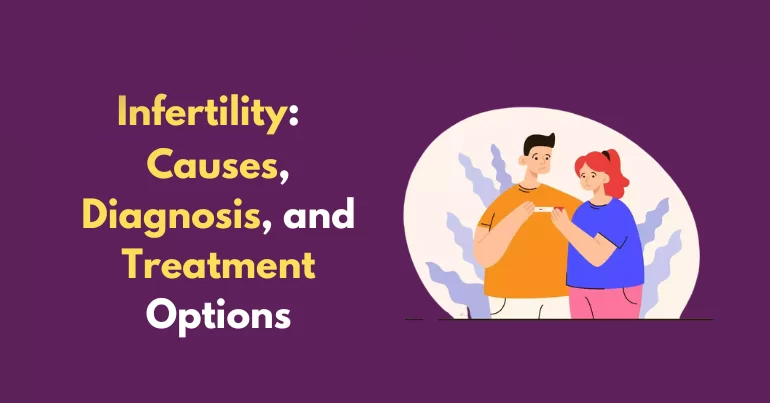Navigating the Journey of Infertility: Causes, Solutions, and Hope for Couples
Infertility is a deeply personal and often distressing journey for couples trying to conceive. It can impact individuals emotionally, mentally, and physically, but the good news is that advances in medical science offer hope. If you're struggling with infertility, you're not alone—millions of people experience it each year, and there are numerous solutions available. This blog post will provide a comprehensive overview of infertility, its causes, diagnostic methods, and the treatment options that can help you achieve your dream of starting a family.
What is Infertility?
Infertility is defined as the inability to conceive after one year of regular, unprotected sexual intercourse. For women over the age of 35, this timeline shortens to six months. While infertility is commonly associated with women, it affects both men and women, with around 40% of infertility cases linked to female factors, 40% to male factors, and the remaining 20% involving both partners or unexplained causes.
Understanding the Causes of Infertility
Infertility can arise from many different factors, some of which are medical, while others are lifestyle-related. Understanding the root cause of infertility is the first step toward finding the right solution. Here’s a breakdown of common causes:
In Women:
-
Ovulation Disorders:
- Polycystic Ovary Syndrome (PCOS): This is one of the most common causes of female infertility, where hormonal imbalances prevent the ovaries from releasing eggs.
- Premature Ovarian Failure: This occurs when the ovaries stop functioning before the age of 40, often due to genetic conditions or autoimmune diseases.
- Thyroid Disorders: Both hyperthyroidism and hypothyroidism can interfere with ovulation and overall fertility.
-
Fallopian Tube Blockages:
- Blockages or damage to the fallopian tubes, often caused by past infections or pelvic inflammatory disease (PID), prevent the egg from traveling to the uterus, where fertilization takes place.
-
Endometriosis:
- Endometriosis occurs when tissue similar to the uterine lining grows outside the uterus, causing scarring and interfering with ovulation and embryo implantation.
-
Age-Related Decline:
- Female fertility naturally declines with age, especially after 35, due to a decrease in the quantity and quality of eggs. Women over 40 may face even greater challenges when trying to conceive.
-
Uterine Conditions:
- Conditions like fibroids (non-cancerous tumors), polyps, and congenital uterine abnormalities can impact fertility by interfering with the implantation of an embryo.
In Men:
-
Sperm Abnormalities:
- Low sperm count (oligospermia), poor sperm motility (asthenozoospermia), and abnormal sperm morphology (teratozoospermia) can prevent successful fertilization.
-
Varicocele:
- A varicocele is an enlargement of the veins within the scrotum that can affect sperm production and quality.
-
Hormonal Imbalances:
- Low testosterone levels or imbalances in other reproductive hormones can impair sperm production.
-
Infections:
- Sexually transmitted infections (STIs) or infections like orchitis (inflammation of the testes) can damage the reproductive organs and reduce sperm quality.
-
Genetic Factors:
- Some men may have genetic conditions that impact sperm production, such as Klinefelter syndrome or Y chromosome microdeletions.
-
Lifestyle and Environmental Factors:
- Smoking, excessive alcohol consumption, drug use, stress, poor diet, and exposure to environmental toxins can all contribute to male infertility.
How is Infertility Diagnosed?
Getting a diagnosis is the first step toward understanding infertility. Both partners typically undergo tests to help determine the cause:
-
For Women:
- Blood Tests: Hormone tests, including FSH, LH, estrogen, and progesterone, to evaluate ovulation and ovarian reserve.
- Ultrasound: Used to check for issues like ovarian cysts, fibroids, or abnormalities in the uterus and ovaries.
- Hysterosalpingography (HSG): An X-ray procedure that assesses the patency of the fallopian tubes and checks for blockages.
- Laparoscopy: A minimally invasive surgery used to diagnose conditions like endometriosis, pelvic adhesions, and uterine abnormalities.
-
For Men:
- Semen Analysis: A lab test that evaluates sperm count, motility, morphology, and overall quality.
- Hormonal Profiling: Blood tests to assess testosterone levels and other hormones related to fertility.
- Genetic Testing: In cases of unexplained infertility, genetic testing may be recommended to check for inherited conditions that may affect fertility.
Treatment Options for Infertility
Once the cause of infertility is identified, your doctor will recommend the most suitable treatment options. Here are some of the most common treatments for infertility:
For Women:
-
Ovulation Induction:
- Clomiphene Citrate and Gonadotropins stimulate the ovaries to release eggs and are commonly used for women with ovulation disorders like PCOS.
-
Intrauterine Insemination (IUI):
- In IUI, sperm is injected directly into the uterus during the woman’s ovulation period, increasing the chances of sperm reaching the egg.
-
In Vitro Fertilization (IVF):
- IVF involves stimulating the ovaries to produce multiple eggs, retrieving the eggs, fertilizing them in the lab, and transferring the resulting embryo(s) into the uterus.
-
Surgical Interventions:
- For women with conditions like endometriosis, uterine fibroids, or fallopian tube blockages, surgery can help improve fertility.
-
Egg Donation and Embryo Adoption:
- If a woman’s eggs are not viable, she may consider using donor eggs or adopting embryos.
For Men:
-
Lifestyle Modifications:
- Improving diet, quitting smoking, reducing alcohol consumption, and managing stress can help improve sperm quality.
-
Medications:
- Clomiphene Citrate can help stimulate sperm production, and hormonal therapies may address hormonal imbalances.
-
Surgical Interventions:
- Varicocelectomy (removal of varicocele) and Vasovasostomy (vasectomy reversal) can improve fertility in some men.
-
Assisted Reproductive Technologies:
- Intracytoplasmic Sperm Injection (ICSI) is a common procedure for male infertility, where a single sperm is injected directly into an egg for fertilization.
- Sperm Donation: When sperm quality is poor or absent, donor sperm can be used in IVF procedures.
Emotional Support and Counseling
Infertility can be an emotional rollercoaster, and it’s essential for couples to have strong emotional support. Seeking counseling, joining support groups, and communicating openly with your partner can help you navigate this challenging time. Many fertility clinics also offer counseling services for individuals and couples.
Conclusion
While infertility can be a challenging journey, there is hope. Advances in fertility treatments, like IVF, ICSI, and IUI, provide many couples with the opportunity to build the family they’ve dreamed of. Whether the solution is medical, surgical, or lifestyle-based, understanding the cause and working with a fertility specialist is the first step toward successful treatment.
If you and your partner are facing infertility, don’t hesitate to reach out for help. Our team of experts is here to guide you through your fertility journey and offer the best possible solutions to help you achieve your dream of becoming parents.
Schedule a consultation today and take the first step towards starting your family!




